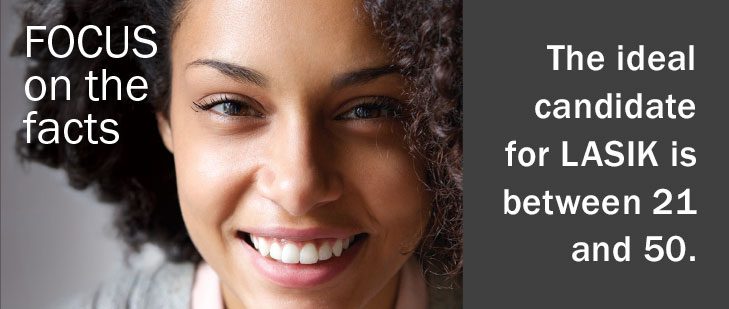Posted by: Heaton Eye Associates in Blog

It’s important to have a thorough screening and comprehensive examination in order for your surgeon to determine that you are a good candidate for LASIK. Excellent and reputable surgeons should not hesitate to explain to the patient that they are not suitable candidates if they have any of the following:
- • Patients who are under the age of 18 are typically not considered to be ideal candidates, as their vision is continuing to change. Once the vision has stabilized, typically in the early 20’s, they become an ideal candidate.
- • Patients over the age of 60 are not only probably experiencing presbyopia (aging of the eye) which requires them to use reading glasses, but they are also likely starting to show signs of the beginning stages of cataracts. There may be other options that are better suited to patients over the age of 50, such as Refractive Lens Exchange (RLE) or even cataract surgery with Lifestyle Lenses that will help them achieve the freedom from glasses and contacts that they were looking for.
- • Patients with thin corneas. The cornea, or clear covering over the colored part of the eye, is where the LASIK procedure is performed. The laser reshapes the cornea by removing tissue. If the cornea is too thin, the patient should not have LASIK.
- • Certain medications may cause fluctuation in vision, and in that case the patient may not be a good candidate for LASIK.
- • Women who are pregnant or nursing are also not ideal candidates for the procedure and should wait until after they have the baby and have stopped nursing.
- • Some medications may affect wound healing – such as retinoic acid and steroids may prevent proper healing after LASIK.
- • Some eye conditions and diseases may also be contraindications to having LASIK, such as keratoconus, glaucoma, herpes in eye area, uveitis/iritis, ocular hypertension, eye injuries or scarring, prior eye surgeries.
- • Blepharitis, or inflammation of the eyelids, may cause the risk of infection or inflammation of the cornea after LASIK. Blepharitis should be effectively treated prior to having LASIK.
- • Dry eyes – it’s important to be screened for dry eye disease, even if you don’t seem to have any symptoms. Depending on the severity of the disease, your surgeon may put you on a treatment plan to get your eyes healthy prior to having LASIK, or they may not recommend having LASIK at all. If you have dry eyes prior to having LASIK, your eyes may be more dry during the healing process. LASIK will not “cure” patients with dry eye disease, so proper education prior to LASIK and a good treatment plan is important.
Heaton Eye Associates offers a free All-Laser LASIK consultation to help answer your questions and determine if you would be a suitable candidate for LASIK, or other vision correction procedures that we specialize in.


